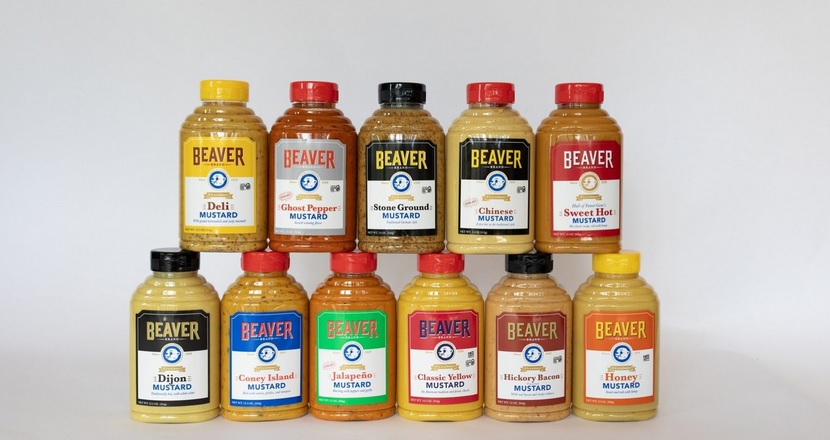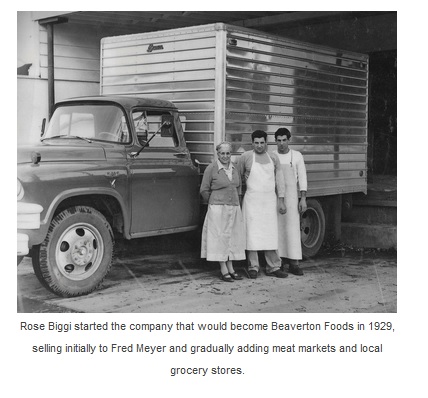
A Profile of OBI Members Series
By Oregon Business & Industry
Nineteen twenty nine was an eventful year in American and Oregon history. The stock market crashed. Intel co-founder Gordon Moore was born. And as the Great Depression set in, Italian immigrant Rose Biggi began bottling horseradish in her Beaverton farmhouse.
Nearly a century later, the stock market is booming, and the companies Moore and Biggi created continue to expand in Washington County on opposite sides of U.S. Highway 26. Intel has a bigger footprint, of course. But legions of people wouldn’t dream of eating a sandwich without Beaverton Foods inside.
The company is best known for its Beaver condiment brand, whose distinctive labels will be familiar to anyone who visits supermarkets in the United States or in the 25 foreign countries in which its gourmet mustards, horseradish and other condiments are sold.
Beaverton Foods is the largest specialty condiment manufacturer in the United States, and its 500-plus recipes require 1,100 different ingredients, says CEO and Chairman of the Board Dom Biggi. But it started with just one.
Rose Biggi – Dom’s grandmother – ground and bottled horseradish in the basement of her home, selling it under the Biggi Fresh Ground Horse Radish label. From her first customer, Fred Meyer, Rose expanded to meat markets and small grocery stores in Beaverton, Hillsboro and Portland.
In 1930, she hired her first employee, family babysitter Esther Troupe, to put lids on jars. Troupe spent the next 60 years with the company.
Meanwhile, Rose Biggi saved and invested. In 1942, she bought a piece of land in Beaverton to expand the business, which she renamed The Beaverton Horseradish Company.
In 1964, The Beaverton Horseradish Company became Beaverton Foods. The family business was run at the time by Rose’s son Geno, who feared that keeping a product-specific name would limit growth. The Beaverton Horseradish Company already had begun to produce mustard.
Armed with a new name and a logo inspired by Oregon State University’s Benny Beaver, the company entered a long period of growth and creativity. Over the next six decades under Geno Biggi’s guidance, Beaverton Foods expanded its product line significantly, adding cream style horseradish, sweet hot mustard, Dijon mustard and many more items. The company also helped popularize honey mustard.
And as it was expanding its own product line, Beaverton Foods also bought other gourmet brands, including Inglehoffer, Napa Valley Mustard Co., Tulelake Horseradish Co., Pacific Farms and Red Duck Foods.
The company’s product selection, distribution and production have continued to expand under Geno’s son, Domonic, and Dom’s nephew, Jeff, who now serves as president. In addition to its own products, Beaverton Foods makes “private label” goods for grocery stores and for various brands. It has produced pineapple salsa for Dole, mustard for Kikkoman and even pumpkin salsa for the Roloff family, who star in the Little People, Big World reality series.
The company’s best-selling product currently is stone-ground mustard, followed by cream-style horse radish, says Biggi. But several other products are “sneaky-great sellers,” including tartar sauce and creamy dill mustard, which sells particularly well in Canada.
Another surprise hit is cranberry mustard, which was developed as a seasonal component of turkey sandwiches but now sells year-round.
Since 2001, Beaverton Foods has manufactured most of its products at its 80,000-square-foot facility just north of U.S. Highway 26 in Hillsboro. It also leases a 25,000-square-foot facility nearby and intends to build a 50,000-square-foot addition to its primary location, says Dom Biggi. The company had intended to break ground on the expansion a few years ago but decided to pause in the face of rising interest rates and Geno Biggi’s declining health. Geno died in 2022.
Beaverton Foods can produce up to 15 different recipes in a single day, says Dom Biggi. To produce its large array of condiments while satisfying its private-label obligations, then, the company the company must reconfigure its manufacturing operation constantly. Biggi says the company never has the same manufacturing day two days in a row.
Despite its unique place in the gourmet-condiment world, Beaverton Foods does have its share of challenges. These include the changing nature of the food business, which requires steady innovation and ever-increasing efficiency, says Biggi. Looming, meanwhile, is a wave of retirements that will involve people who’ve been with the company for 20 to 30 years. Replacing that institutional knowledge won’t be easy.
Nevertheless, Biggi expects Beaverton Foods to continue its trend of steady growth.
“We have enough items to grow organically one store and restaurant chain at a time” he says. “We’ve found that when people try our products, they become customers for life.”
Beaverton Foods is “playing the long game,” says Biggi, just as it has since 1929.
Disclaimer: Articles featured on Oregon Report are the creation, responsibility and opinion of the authoring individual or organization which is featured at the top of every article.



